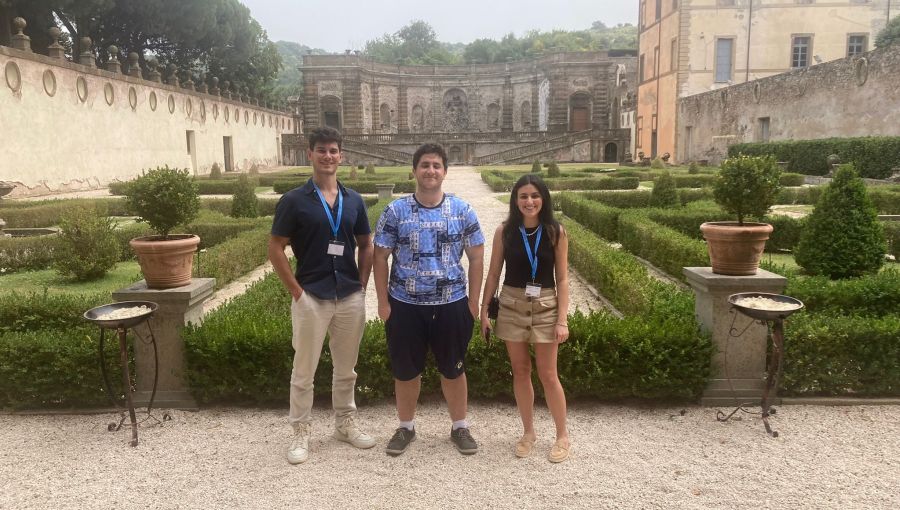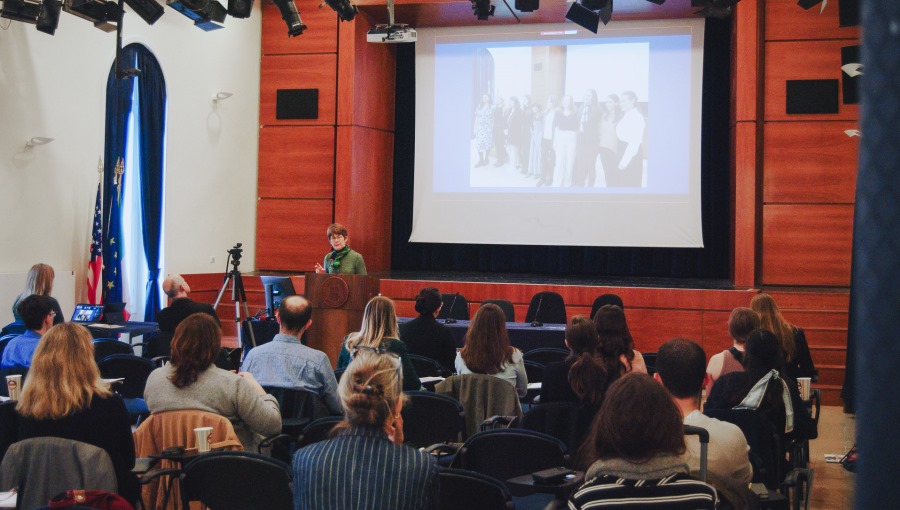JCU Student Delegation Attends 26th UN Climate Change Conference in Glasgow
A delegation of five JCU students attended the 26th UN Climate Change Conference of the Parties (COP26), from November 4 to November 7. The students who participated were Giacomo Di Capua (President of the Grassroots Club), Razvan-Valentin Moldovan (Secretary of The Matthew, JCU’s student newspaper), Alice Finno (Events Coordinator of the Grassroots Club and Staff Writer for The Matthew), Julissa Castro Ruiz (Head of Editors at The Matthew), and Eleonora Cammarano (Food Officer and incoming Vice-President of the Grassroots Club). The delegation, who was accompanied by Business Professor Michèle Favorite, held a Town Hall Meeting on November 23 to share what they had learned with the JCU community.
Originally scheduled to take place in November 2020, COP26 was postponed due to the COVID-19 pandemic and was held in Glasgow, Scotland from October 31 to November 13, 2021. Representatives from 190 countries discussed the climate emergency and ways to fight it, and various events were organized for unofficial participants. “We participated in fantastic side events, from the New York Times Climate Hub to the University of Glasgow to the Climate Change Summit, where we listened to, shared, and learned from scientists, diplomats, academics, activists, and business executives,” said Professor Favorite.

The JCU student delegation on the way to COP26
In his opening remarks at the Town Hall Meeting, JCU President Franco Pavoncello quoted British writer H. G. Wells, who said that “Civilization is a race between education and catastrophe.” President Pavoncello said that the current climate emergency reminds him of this quote and that he believes that education plays a fundamental role in the fight against climate change. Professor Favorite said that “although the outcome of COP26 is far from perfect and it’s not what we were hoping for, it sets a new vision for the world where coal use is drastically cut back, fossil fuel subsidies are eliminated, and governments commit to the most ambitious targets of the Paris Agreement. Other important agreements were reached on the sidelines: the U.S. and China pledged to work together to cut emissions this decade, 100 countries vowed to end deforestation by 2030, 100 governments agreed to cut methane emissions by 30% by 2030, India promised to reach net-zero by 2070.”
Giacomo Di Capua started by giving a thorough overview of the history of the Conference of the Parties. He explained that 1988 was a crucial year for International Environmental Law because that’s when the UN General Assembly passed the first resolution on global warming. In 1990 the second World Climate Conference took place, and it focused on global warming. In 1991, the UN Framework Convention on Climate Change (FCCC), an international environmental treaty to fight human interference with climate was adopted and signed by 154 states.
In 1995, the first Conference of Parties (COP1) was held in Berlin, and in 1997 the Kyoto Protocol was developed, which established emission reduction targets for several developed and industrialized countries. In 2015, 196 countries signed the Paris Agreement, which focused on reducing emissions, increasing the number of renewables and alternative sources of energy, keeping global warming below 1.5 degrees Celsius, establishing clear deadlines to achieve these goals, and setting a budget of 100 billion dollars a year to help developing countries to cope with the consequences of climate change.
Di Capua explained that three main points were discussed at COP26. First, states are expected to decide how public finance will deliver the 100 billion dollars to developing countries. Second, after the 2020 cycle of “Nationally Determined Contributions,” or plans that each country makes to ensure that their goals are met, the resubmissions need to be more ambitious and updated. And lastly, the Paris negotiations need to be operationalized, meaning that technical systems need to be put in place to make it easier to tackle climate change.
Alice Finno spoke about “Youth Involvement in Glasgow.” Finno said that the JCU delegation attended the screening of a documentary called Youth Unstoppable, by Canadian youth climate activist and filmmaker Slater Jewell-Kemker, who has been attending COPs since she was 13 years old. The documentary took 12 years to complete, and it shows the evolution of the youth climate movement from 2008 to 2020.
According to Finno, a positive thing about COP26 was the fact that different voices emerged from the Youth Activist Movement. However, she explained that contrasting feelings coexist in the movement: on the one hand, there is hope and optimism, and on the other despair and discouragement. Finno added that the JCU delegation shared these feelings, because after some panels they felt disappointed due to the lack of proposed solutions or changes, but on the other hand they felt empowered by being part of the conversation with like-minded people.
Julissa Castro Ruiz talked about “Women’s and Indigenous Rights.” The JCU delegation attended a panel that denounced the lack of attention that policymakers give to indigenous communities. Over 1500 environmental activists have been murdered since the Paris Agreement was signed in 2015. Ruiz explained that decisions are being made without knowing how they will affect local communities and without knowing what’s happening on the ground. She added that indigenous activists protect more than 80 percent of the world’s biodiversity, and that they not only have knowledge about the land, but also have a spiritual connection to it. As for women’s role in the Climate Activist Movement, Ruiz explained that there is a correlation between education and climate change, and she added that women have an important role in educating the youth.
Eleonora Cammarano, Food Officer and incoming Vice-President of the Grassroots Club talked about “The Law of Climate Justice.” She said that Public International Law is essential for environmental protection and that the evidence of climate change should be accepted in the field of justice. She also said that it’s necessary to think of whether nature-based solutions or technology-based ones would be better to tackle the issue.
Professor Favorite concluded the meeting by saying that at COP26 she saw a big shift from what she witnessed at the “Rio Earth Summit” in Rio de Janeiro in 1992. She said that in Rio most participants were males over the age of forty, whereas in Glasgow many young people actively participated in the discussion on climate. She added that today’s youth are more informed, that universities play a crucial role in the fight against climate change, and that JCU is doing its part.





